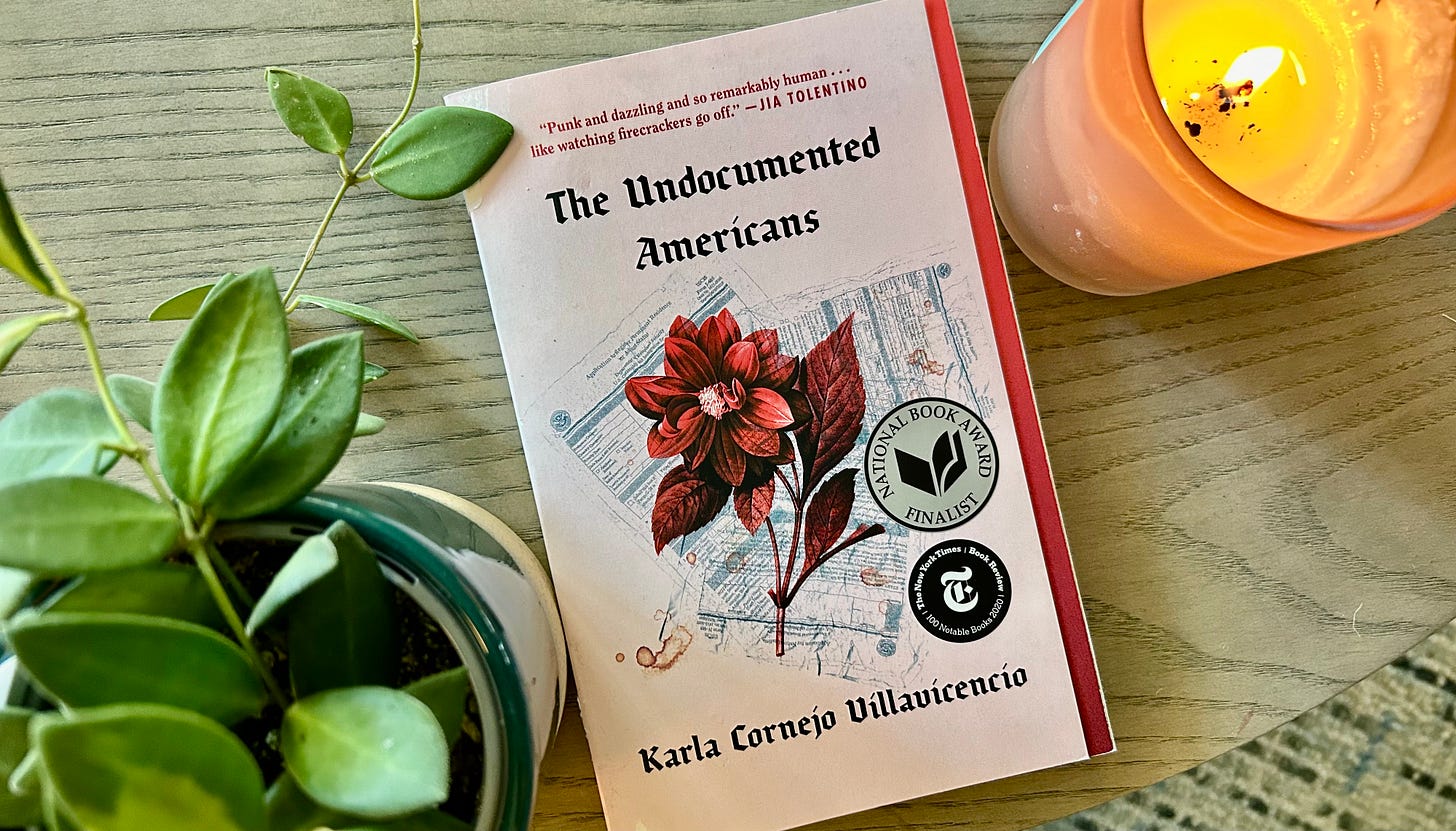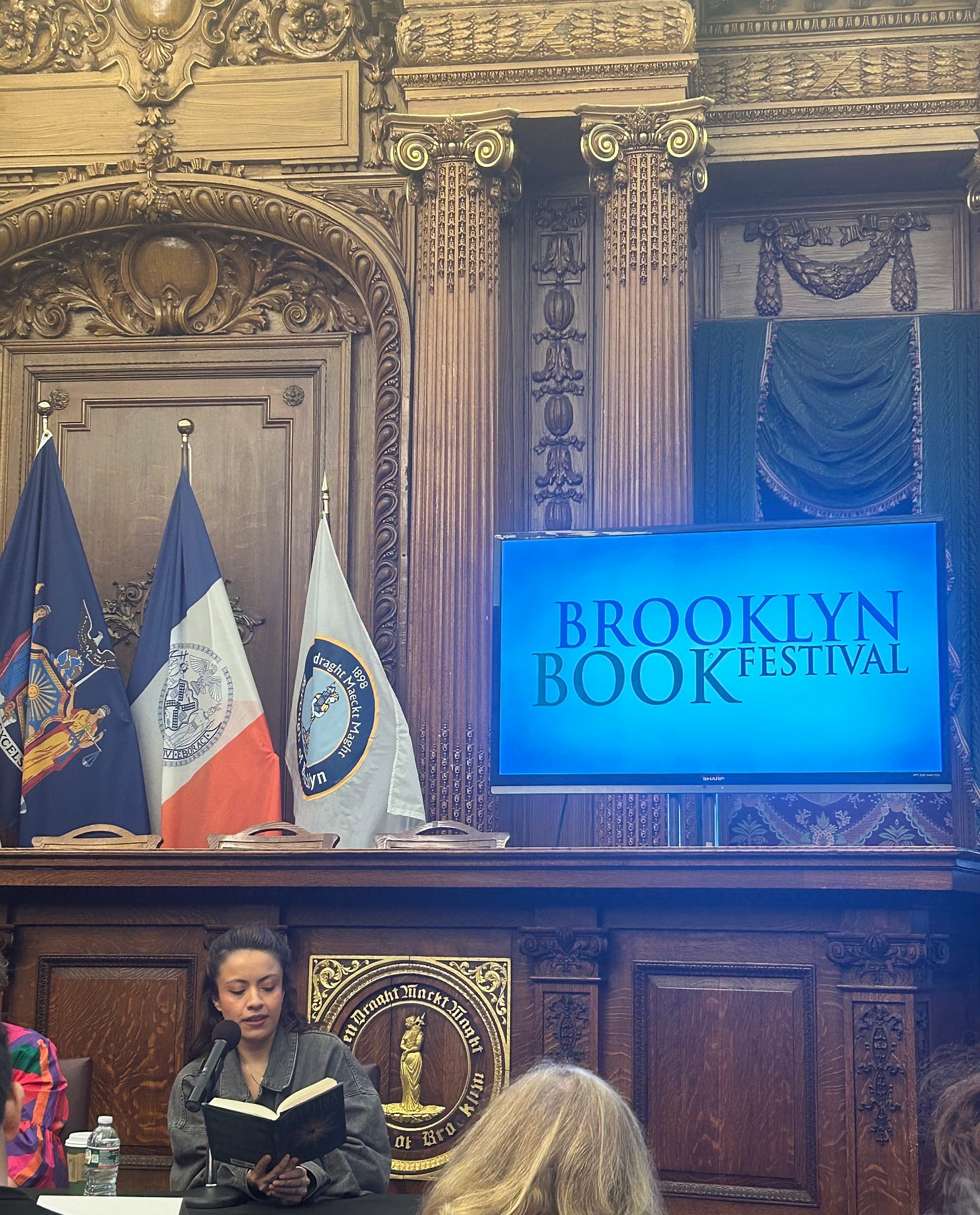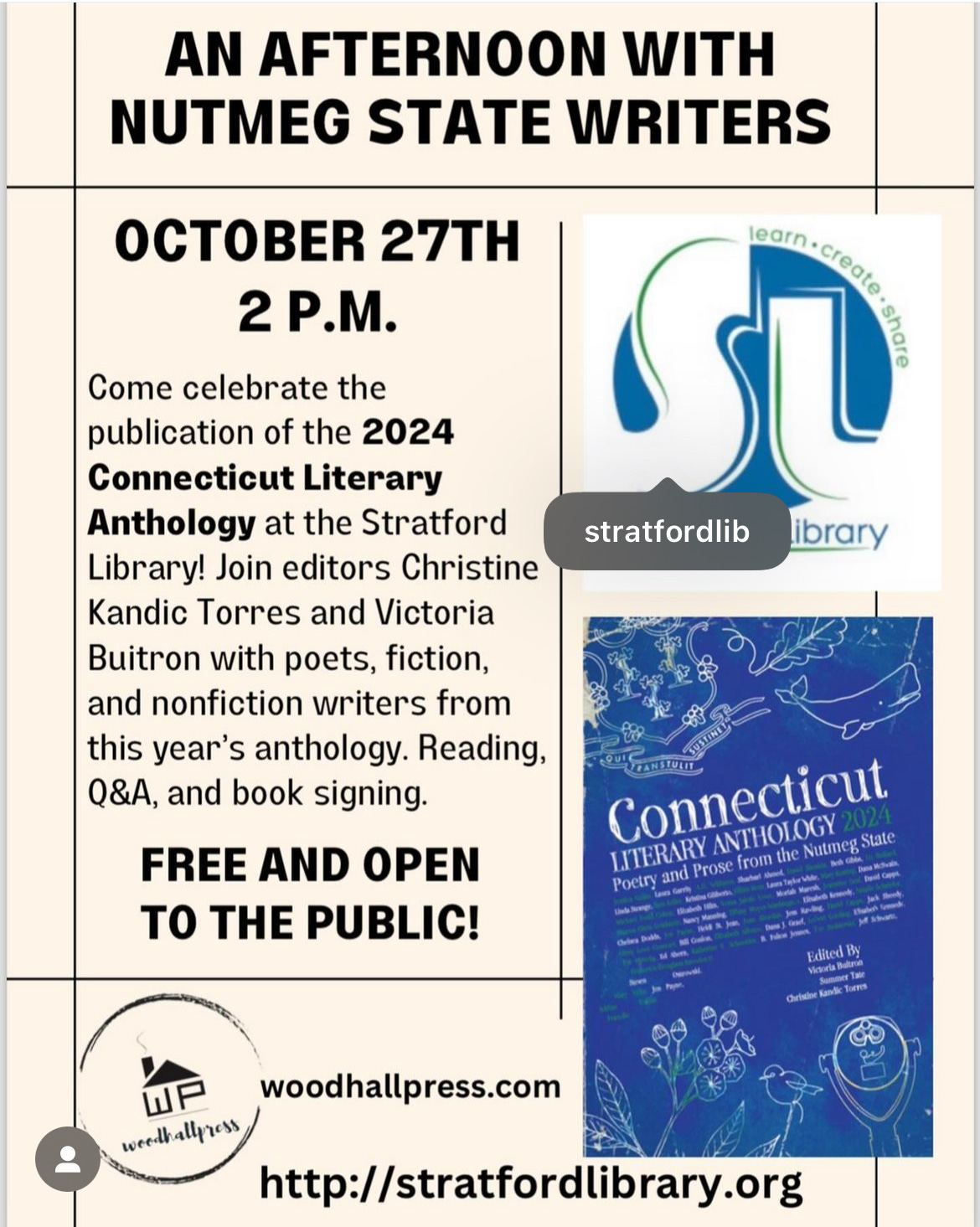Immigrant Strong: October 2024
My reading on Sunday, plus essays on finding home in Rome, American identity, and loneliness
I am excited to have an essay in the Connecticut Literary Anthology 2024, which is now officially out in the world! It’s one of a few essays I’ve published that’s not related to immigration or identity. Called “One Cartwheel,” the piece is about an unfortunate accident my daughter was in that led to a surgery, and explores issues such as invisible wounds and pain in parenting. For those of you in Connecticut, l’ll be reading from it this Sunday, Oct. 27 at this event—free and open to the public! Please come and support writers, a great publisher, and a public library!
Book
I heard Karla Cornejo Villavicencio speak about her novel Catalina at the Brooklyn Book Festival last month and realized that while I’ve featured her essays and interviews before, I never highlighted her first book, The Undocumented Americans. This stunning book—a National Book Award Finalist—combines personal narrative and reporting to paint a picture about what it means to be undocumented in this country. Given that we’re two weeks away from another election marked by immigration—and the racism, lies, and fear-mongering that always accompany conversations on the topic—I wanted to give this book the space it deserves. It was published four years ago, but is just as relevant, tender, and powerful today. And I look forward to reading Catalina, who escapes Latin America, is raised by her undocumented grandparents in Queens, New York, and is admitted to Harvard.
Essays and Interviews
I had the privilege of having Rajiv Mohabir as my workshop leader at the Kenyon Review Writers Workshop this summer. He is the editor of a new anthology, I Will Not Go: Translations, Transformations & Chutney Fractals; here is an interview about it in Asymptote journal.
“We must remember that Spanish, French, and English are languages that marked our backs, shackled us, but most people only consider the colonial languages of the Caribbean when it comes to translating a specific geopolitical area. Creoles, Kréyols, Hindustanis, Indigenous languages—these are Caribbean languages that are beautiful and nuanced in their histories of ongoing displacement (as is the case for Indigenous folks), enslavement, indenture, and other kinds of colonization. I want to expand the area of focus by shifting the gaze to a speech community in peril.”
I’ve always loved André Aciman’s writing; here is a LitHub excerpt from him about struggling to find home in Rome from his newest book, Roman Year: A Memoir.
“What I felt was the persistent, undefinable numbness that eventually overtakes you and won’t let go. You feel nothing because there’s nothing to feel, the pain is still working itself out, has yet to come, will come, just never when you expect. I tried to feel grief instead; grief was easier because it was factual and thinkable—grief for what was lost, for who we’d been and had left behind, grief for old habits that were meant to die but hadn’t yet, grief for my father, who was still in Egypt and might be arrested on who knows what trumped-up charges before even being allowed to rejoin us, grief for my deaf mother, who knew not a word of Italian and was as broken and rudderless as my brother and I.”
I recently attended my citizenship ceremony so I related to many things Fernanda Santos writes about in this piece about mixed feelings and identities. Here is Becoming ‘Latina’: How marriage, motherhood and loss shaped my American identity for The 19th.
“On the day of my naturalization ceremony in 2005, I felt a mix of pride and betrayal. It was as if in embracing U.S. citizenship, I was somehow severing the roots that kept me tethered to Brazil, the country under my skin. “There’s ‘American’ in ‘Latin American,’” my husband would tell me. “Do your thing. Be you. You’ve got nothing to prove.””
I enjoyed this interview for The Rumpus—My Voice Doesn’t Fall Neatly into a Category: A Conversation with Desiree Akhavan.
“I think loneliness brought me to autofiction. I wanted to show people I exist. This is my account. I was feeling isolated because I couldn’t see stories like mine, especially stories about marginalized communities. Those characters were always so altruistic, everything about them like they were martyrs—either victims or the butt of the joke. And I wasn’t interested in those narratives. I wanted to explore what it was to be human and flawed and funny and weird.”
I think many of you will appreciate Bruna Dantas Lobato’s LitHub list, Belonging Somewhere Else, Too: Seven Books on Making a Home in a New Country.
“Though I didn’t grow up in a cedar-shingled house, something about it reminded me of home: the slanted ceiling in the bedrooms, the warm hardwood floors, the small kitchen. I’ve long tried to capture this in writing: the feeling of home, homeyness, familiar comfort.”
In this Electric Literature interview, noam keim discusses settler colonialism, a childhood with violence, the importance of daily walks in their life, and more.
“I am a strong believer of holding multiple complex and often contradictory truths at once and my relationship to freedom is very much centered around diverging and equally important realities: I regret moving to the United States and I would not have built a life for myself without going into exile. To be honest, everybody I know who is in exile shares that sentiment. I have gained incredible freedom and have been able to heal so much of my childhood wounds and I would do anything to be able to settle back into a version of my old Parisian life.”
I hate even typing the name of a certain xenophobic and incoherent felon in this newsletter, but wanted to share Carlos Lozada’s New York Times opinion essay, When Trump Rants, This Is What I Hear.
“I’ve always been jealous of those Americans who claim one unmistakable hometown, the place whose streets and rhythms they instantly recognize, a singular setting that anchors their memory. I ache for that, but I lost it. When I visit Lima, I feel out of place. My cultural references are dated, my mental maps fragmented, my friendships treasured but fragile. I don’t quite get the jokes. My longing is for a place that no longer exists, just like that other person I might have been.”
I’ll wrap it up with a couple of paragraphs from Elif Shafak, whose stunning words about home and identity often make it into this newsletter. For LitHub, here is Elif Shafak on the Power of Literature and Being a Writer in the “Age of Angst.”
“I believe this world will be a more dangerous and broken place to live in if it were to become the Age of Apathy. The moment we stop caring and writing and talking about what is happening today in Gaza, in Ukraine, in Sudan… The moment we become desensitized, atomized, indifferent and numb. This is what the philosopher Hannah Arendt warned us about.
Literature is the antidote to numbness. Writers cannot stop wars. We cannot make hatred disappear. But we can keep the flame of peace and coexistence and empathy alive. Literature’s power is that it reminds us of what we are capable of, not only destruction and division, but also of beauty, solidarity, sisterhood and love.”
Thanks for reading—and if you can, vote! I hope to see some of you Sunday—info below.
vesna
About this newsletter: Writing about immigrant and refugee life—the struggles, triumphs, and quirks—by immigrants and refugees, and children of immigrants and refugees. For more info, here is a Q&A I did with Longreads about the newsletter. Photo in the logo: Miguel Bruna/Unsplash.
About me: I grew up in the former Yugoslavia, then immigrated to Canada, and now live in the United States, where I work as a writer and communications consultant for nonprofits in the human rights and international affairs fields. I have written about my immigrant experience for the Connecticut Literary Anthology 2023, The New York Times, Pigeon Pages, the Washington Post, the New York Daily News, and Catapult, and have essays forthcoming in Back Where I Came From: On Culture, Identity, and Home, and Connecticut Literary Anthology 2024. I participated in Tin House and Kenyon Review Writers’ Workshops, and won the Poet & Author and Parent Writer fellowships from Martha’s Vineyard Institute of Creative Writing. Find me on Instagram, @vesnajaksiclowe, or twitter, @vesnajaksic.







Vesna, congratulations on your anthology publication and thank you for this amazing roundup of publications and articles! I am also an Andre Aciman fan <3
Thank you for this beautiful newsletter.